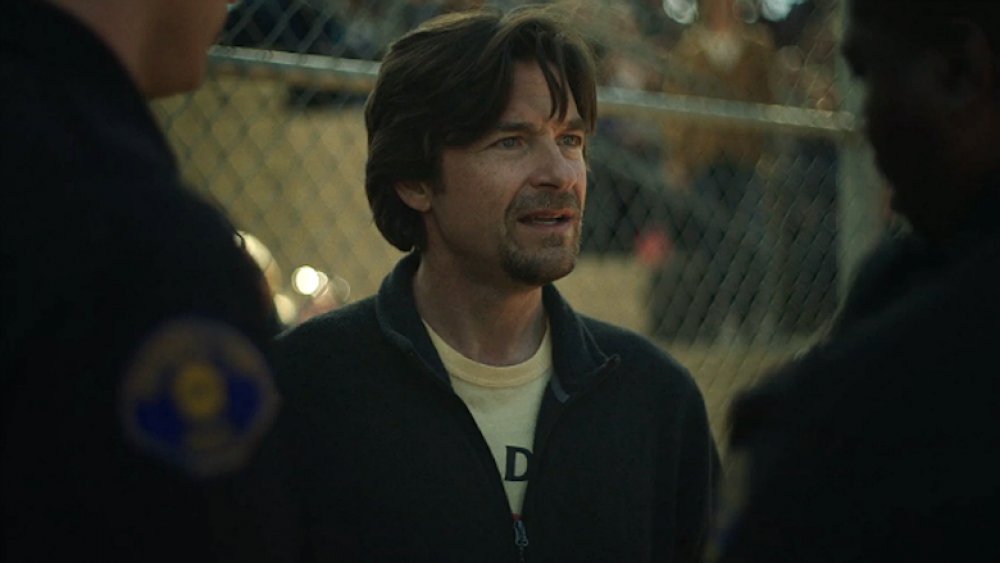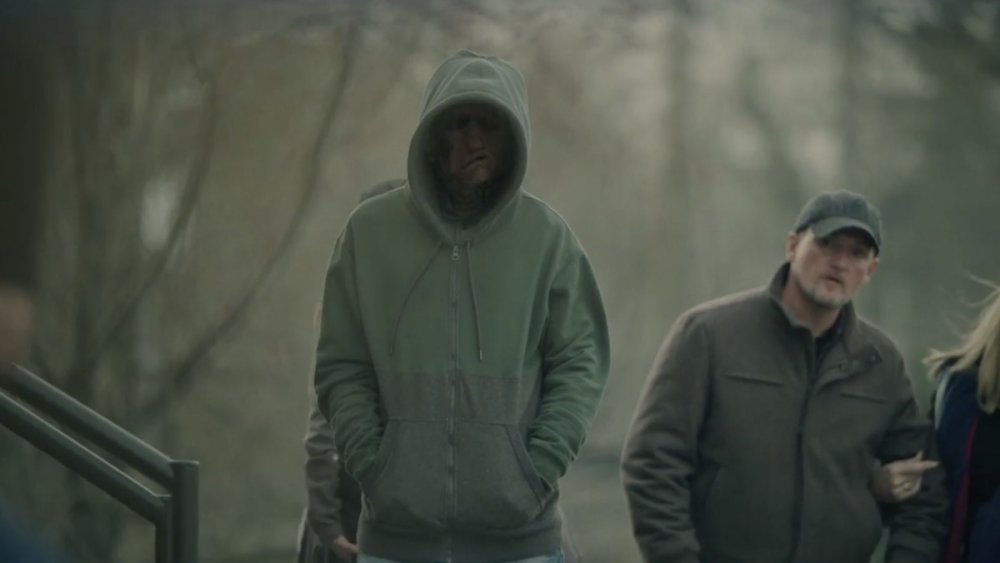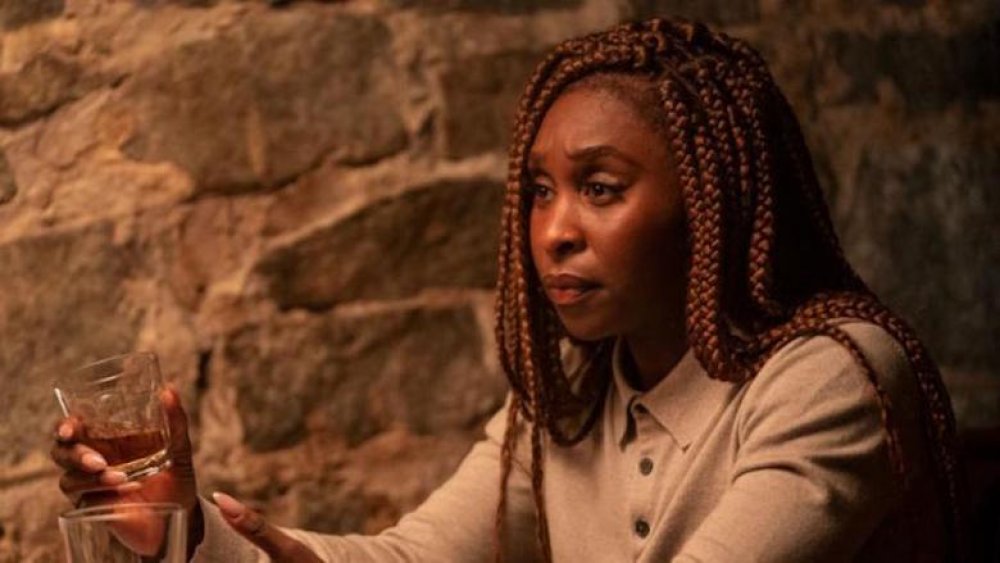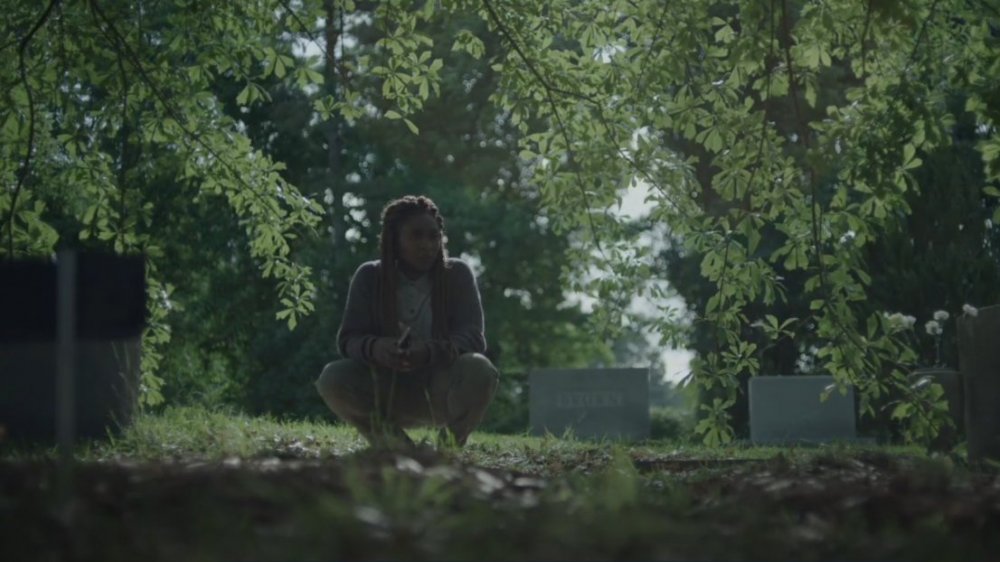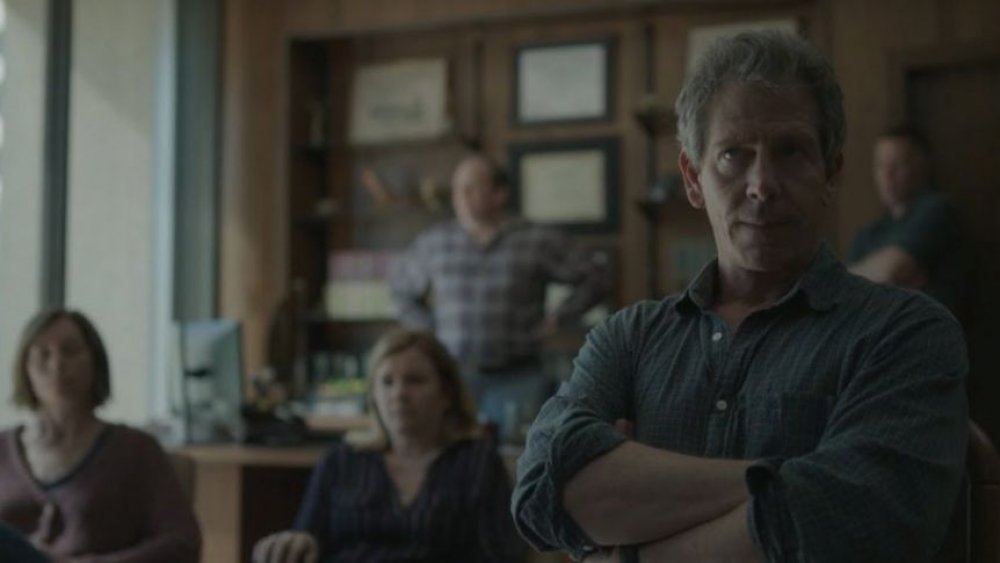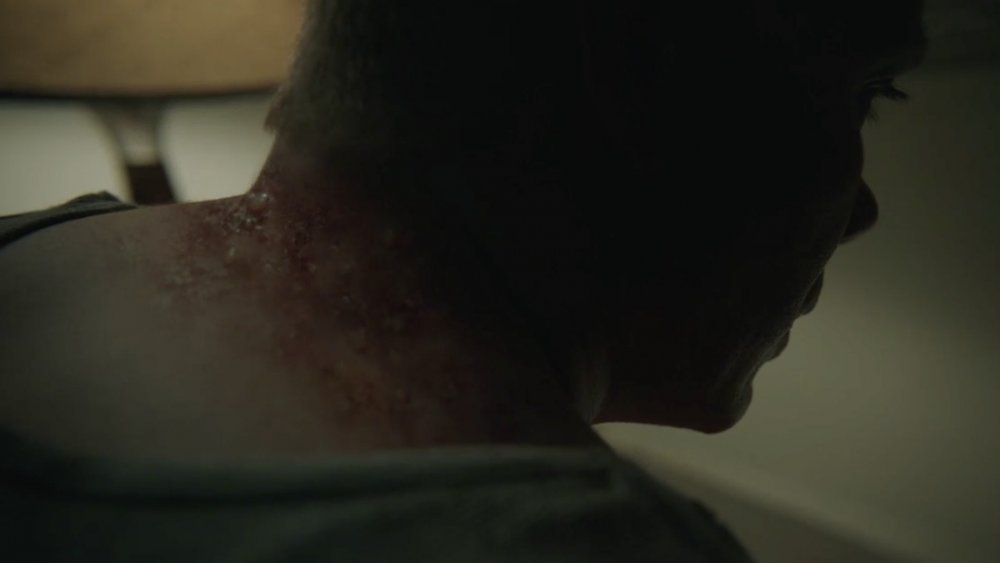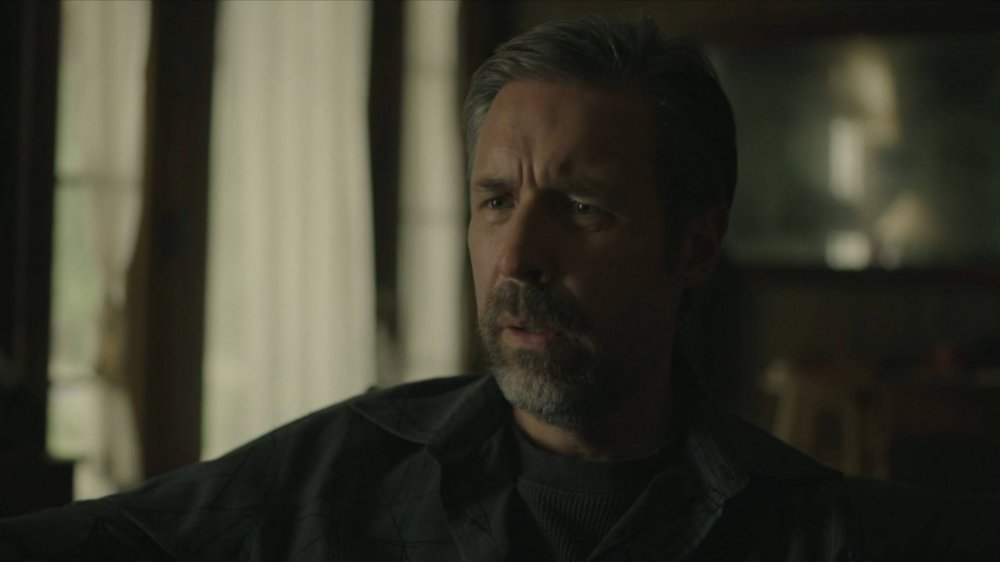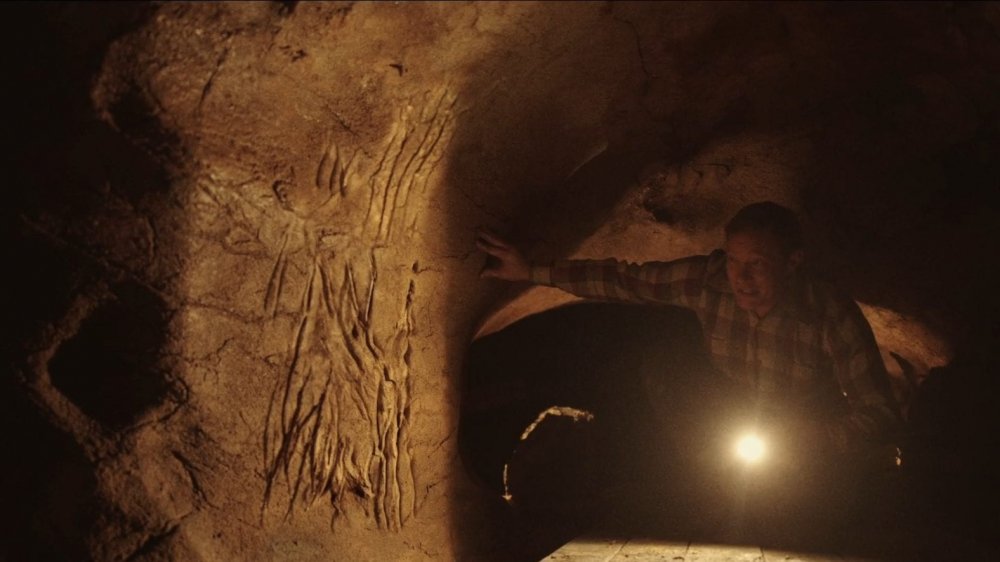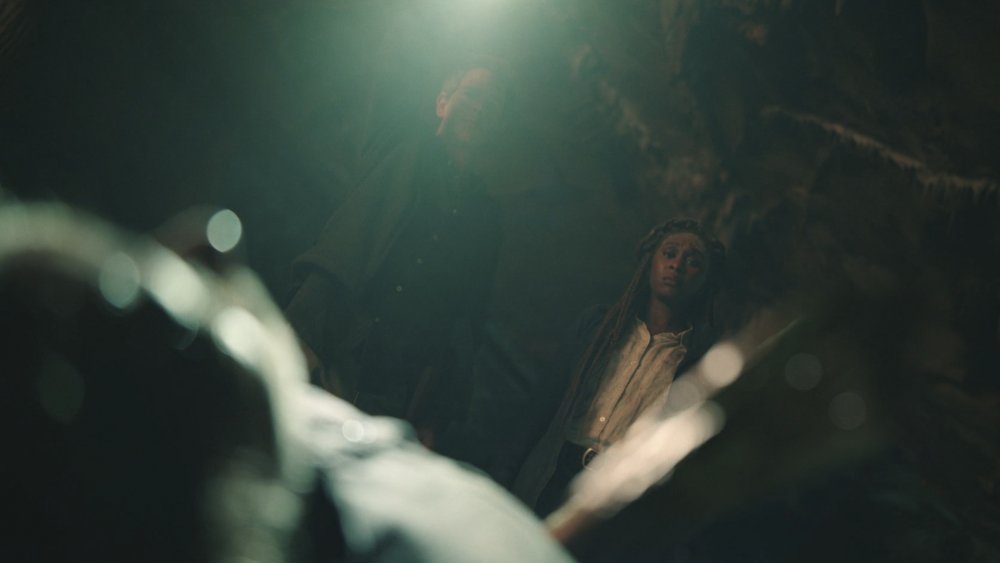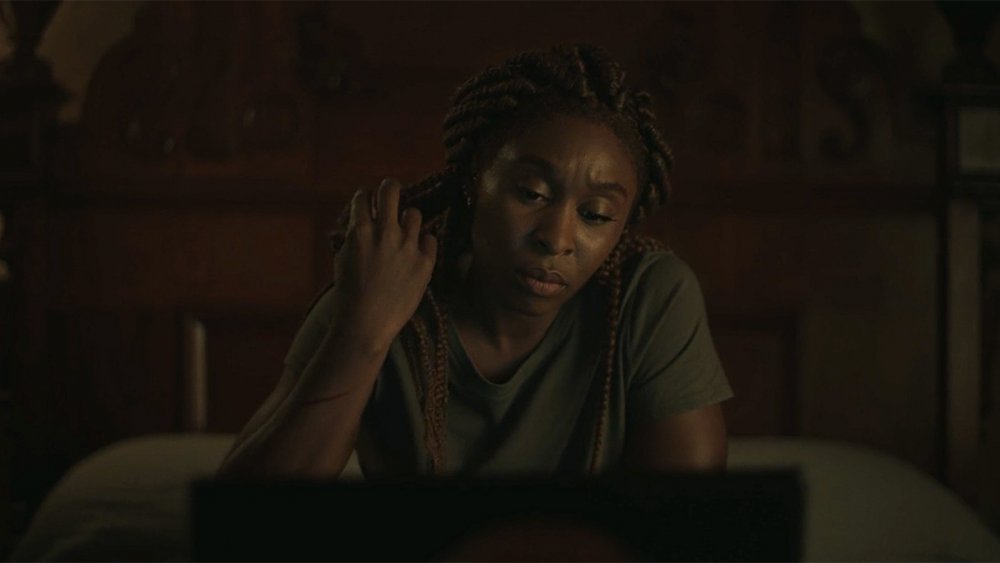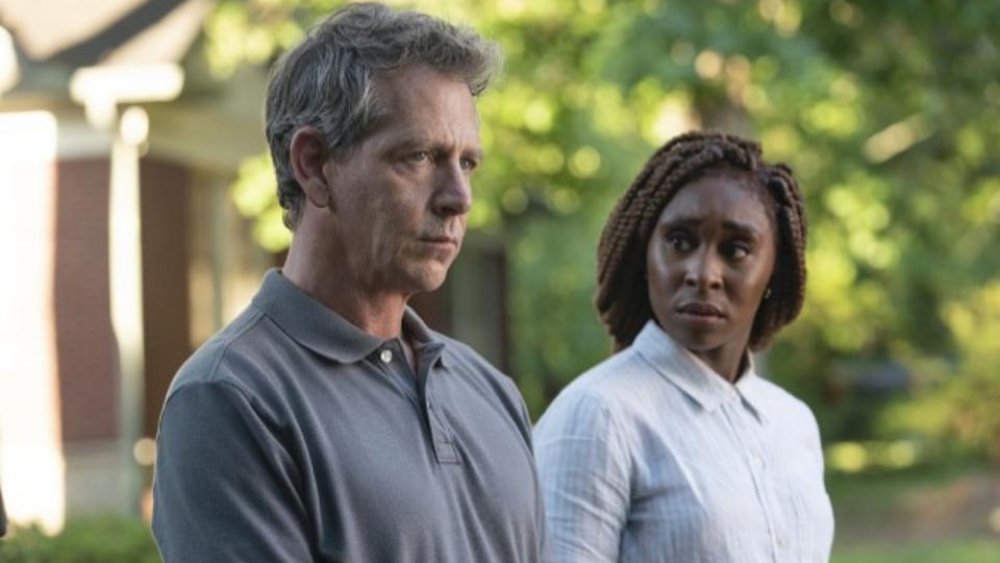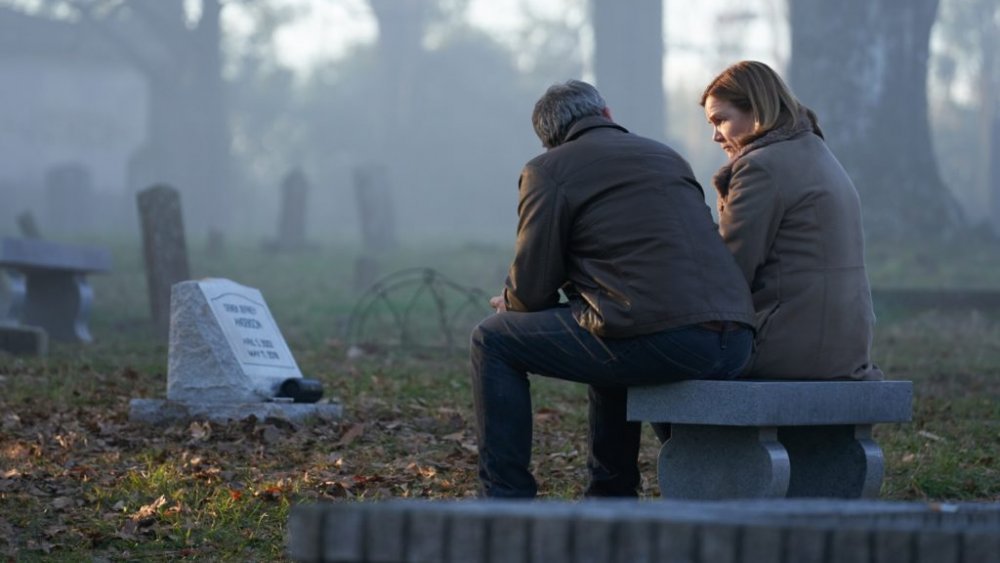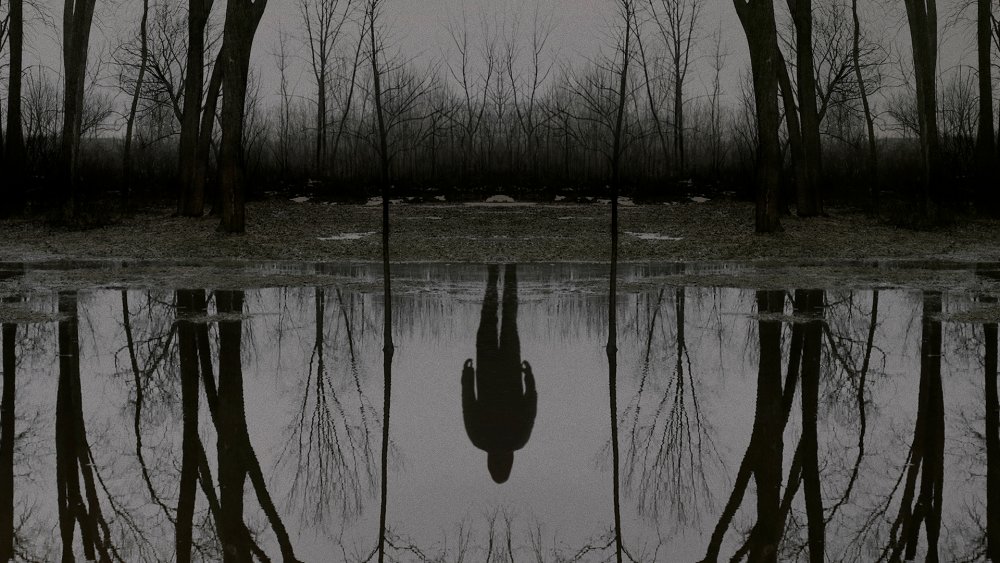The Ending Of The Outsider Season One Explained
How can the same person be in two places at once? This is the fundamental question that first drives HBO's The Outsider, an adaptation of Stephen King's novel of the same name. When the brutalized body of young Frankie Peterson is found in the woods of Cherokee City, Georgia, the DNA evidence, videos, and witnesses point to beloved baseball coach and English teacher Terry Maitland (Jason Bateman). Shocked by the ungodly viciousness of the crime, and certain their evidence would hold up in court, Cherokee City PD headed by Detective Ralph Anderson (Ben Mendolsohn) and his colleague Yunis Sablo (Yul Vazquez) make a show of publicly arresting Terry at a ballgame, in front of virtually the entire town.
The plot thickens quickly when new footage of Terry surfaces from a teacher's conference hundreds of miles away when the boy was killed. Anderson is no longer sure he has a slam dunk case. Was Maitland framed? Does he have a twin? Is something else entirely going on? The story escalates by The Outsider's second episode as Anderson doubts Maitland's guilt, culminating in Frankie Peterson's brother opening fire on Maitland and the police on his first day in court, killing Maitland, who uses his last breath to once more proclaim his innocence. This is only the beginning for Ralph Anderson and his colleagues, as well as the Maitland family, who work to clear Terry's name posthumously. This is the ending of The Outsider's first season explained.
Who is the strange man hanging around Cherokee City?
The Outsider wastes no time. By its second episode, the presumptive main character of Terry Maitland is dead, and his family is left to pick up the pieces. Because of the grotesque nature of the crimes Terry was accused of, his wife Glory (Julianne Nicholson) and daughters Jessa (Scarlet Blum) and Maya (Summer Fontana) have to deal with the judgment of the town as they mourn so much loss. Glory's lawyer Howie Salomon (Bill Camp) encourages her to sue Cherokee City PD including the district attorney Hayes (Michael Esper), who made the choice to expedite Terry's criminal charges.
All the while, Jessa is having what everyone thinks are nightmares, but she insists are not — visitations from a man who started out looking like her father but whose face gets more and more deformed as he terrorizes her nightly. The man has a message for Ralph Anderson: stop now or you're going to die. And a man who fits the description of Jessa's tormentor is seen all over town, watching while Terry is killed. Watching while Frankie Peterson's father tries to kill himself. Watching the Maitland house. Lurking over a newborn's crib in a heart-stopping moment.
While studying CCTV footage of the blood-soaked person who looks just like Terry Maitland, Ralph Anderson notices that "Terry" scratches the hand of Claude Bolton (Paddy Considine), the manager of a local strip club. Anderson doesn't know what this means yet, if anything, but Claude is fully on his radar going forward.
When in doubt, send for reinforcements
After a farmer finds Terry Maitland's clothes covered in a strange goo in his barn, the physical evidence gets confusing. "Terry's" fingerprints appear to be that of an elderly version of himself. And while visiting the barn, Detective Jack Hoskins (Marc Menchaca) sees a distorted figure and something touches the back of his neck, burning him.
Detective Anderson traces the white van that "Terry" used to transport the boy to the woods before killing him all the way back to Dayton, Ohio, where the real Terry and his family had been visiting his dad in a nursing home. The coincidence only casts more doubt on Terry's guilt.
As the evidence gets more and more inconclusive, Howie Salomon suggests bringing in an outside investigator. Holly Gibney (Cynthia Erivo) is an unusual woman with a plethora of genius talents. She travels first to Dayton, where she discovers a nurse working where Maitland's father lived, Heath Hofstadter (Martin Bats Bradford), had also been convicted of a brutal rape and homicide of two girls. Footage shows that Terry had contact with Heath, and Jessa informs the team that her father had been accidentally scratched by him. Holly's incredible brain goes into overdrive as she discovers Heath Hofstadter had in turn been in contact with a woman, Maria Caneles (Diany Rodriguez), in Harlem — and she was later also convicted of the rape-murder of a little boy.
Too many coincidences
As Holly explores the lives of these other two supposedly innocent folks accused of eerily similar crimes, she discovers that an entire tsunami of tragedy followed in their wake. Heath Hofstadter killed himself in prison, and his mother also killed herself by crashing her car. Maria Caneles' uncle and father were murdered by a family member of the boy she claimed she didn't kill. And in the meantime, Frankie Peterson's mother died of a heart attack, and his father is on life support after the botched suicide.
Holly notices that the graveyards where key folks were buried in Dayton and New York had abandoned buildings nearby where someone could easily hide and watch. Checking in with Ralph Anderson in Cherokee, Holly discovers that the graveyard where Terry is buried is right next to the barn where the goo-covered clothes were found. Holly connects with Andy Katcavage (Derek Cecil), a former detective who agrees to help her.
In Cherokee, Jack Hoskins is under the spell of whatever thing touched him in that barn, leaving horrible blisters on his neck and causing erratic behavior. Similarly in Dayton, another man with boils on his neck, Tracey Powell (Drez Ryan), turns out to be Heath Hofstadter's cousin, and he ends up dead, but only after a brief exchange with Holly at Heath's grave when Tracey makes the enigmatic statement that "he got me good too." Holly takes a picture of the wounds on his neck before he leaves the cemetery.
Doppelgängers, Grief Eaters, Dark Uncle, and El Cuco
Because one person cannot exist in two separate realities, Holly suspects that whomever is killing children while looking like someone else likely isn't human. While speaking with Maria Caneles in Rikers, Holly meets a woman who tells her about the legend of El Cuco, a Mexican legend about a monster that comes at night and snatches misbehaving children. While the creature has many names and descriptions from around the world — Doppelgänger, Grief Eater, Dark Uncle — Holly first calls it "the entity."
Back in Cherokee City, Anderson and company have found out that the white van used by killer Terry had been stolen by a kid named Merlin (Jakob Gruntfest), who took it on a joyride and dumped it in the parking lot where it was subsequently stolen. Merlin saw the man who took the van, drawing a deformed person very much like the one Jessa Maitland drew — as well as Ralph's own wife Jeannie (Mare Winningham), who also received an ominous visitation from the creature. When Jeannie puts all the drawings in a row, the similarities are impossible to ignore.
When Holly finally makes it to Cherokee after a few scary moments orchestrated by El Cuco to thwart her, she presents her findings in as methodical a way she can to everyone involved — including Glory Maitland, who calls her insane. The only people who seem to take Holly seriously are Jack Hoskins, because he's knows she's 100% correct, and Mexican-American detective Yunis Sablo, who grew up with tales of El Cuco himself.
From crime procedural to supernatural chiller
Even with all the building evidence, Ralph Anderson simply cannot wrap his brain around the idea that a shapeshifting monster could be responsible for these crimes, even as more and more of his colleagues begin to consider and agree with Holly's assessment. Even when Holly finds the same residue from the barn on the chair where El Cuco terrorized Jeannie, Ralph still doesn't believe. The Outsider does a great job of putting the rational mind of a police detective up against supernatural events that can't be explained any other way.
Because Hoskins was unable to stop Holly from making her presentation, El Cuco attacks him, taking on the form of Hoskins' abusive mother and beating him to a pulp with the warning to get rid of Holly or worse will happen. Holly, unfortunately, saw Hoskins as an ally from the meeting, so when he offers to drive her out to the barn where killer Terry's clothes were found, she goes with him. It doesn't take her long to see the blisters on his neck; using some extremely quick thinking, Holly manages to escape from his clutches and get back to Cherokee.
A battered Hoskins, hearing the voice of the monster in his head, hitchhikes to the spot where he has been doing the creature's bidding in a cave in the woods. He brings it deer and later a hunter to feed the thing as it finishes its transformation. But the monster wants a child.
Protecting the next innocent victims
Everyone except Ralph is on board with Holly's El Cuco theory, so their next point of concern is Claude Bolton, who had been scratched by Terry Maitland in the beginning. Claude has also suddenly up and quit his job and gone home to Cecil, Tennessee where his brother Seale (Max Beesley) lives in their family home. Holly says she will go to Cecil and wait with him until El Cuco makes his next attack — wearing Claude's face and DNA — so she can be his alibi. Almost the entire team of law enforcement goes along, with the exception of Alec Pelley (Jeremy Bobb) and the lawyer Salomon. There's nothing more solid than an alibi provided by law enforcement, even though both Claude and Seale think the group is completely nuts. Later, Claude admits that he's been feeling like someone or something has been crawling inside his head and watching him. He quickly gets on board with Holly's theory.
That is, until a young boy is almost snatched at the local Cavestock festival by a man wearing a fox mask. When the man is tackled and the mask comes off, he looks like an unfinished Claude Bolton. Holly's plan worked to alibi the real Claude, but now they have to find and kill the monster before it does more damage.
The monster exploits Claude Bolton's family history
The young boy who was almost taken by El Cuco at Cavestock tells Cherokee PD that the man talked of a Bear Cave where you can see the marks from bears who sharpened their nails on the walls. Because of the psychic link between Claude and El Cuco, Claude needs to be separated from the investigating group so the monster doesn't know how close they are to finding it.
Claude's brother Seale identifies the Bear Cave as a place where a number of his relatives died in a tragedy. Seale talks about two boys who got lost in the Bear Cave system, and how the 32-man rescue party all perished when the cave collapsed, sealing them inside to die a slow and terrible death. El Cuco feeds off pain and sorrow, so setting up in the cave the Bolton family considers its graveyard makes perfect sense within the internal logic of The Outsider.
But where Seale Bolton was so helpful in pointing to the Bear Cave's exact location on a map, he quickly sets the entire group down a new tragic path. Claude had been shielded from the group's plans to go to the Bear Cave and hopefully kill the monster. Thinking he's being protective, Seale goes ahead and tells his brother what's going on, instantly alerting the creature who sets his minion and expert sniper Jack Hoskins to greet the group with his rifle.
Showdown at the Bear Cave
Thanks to Seale, when the group of investigators led by Ralph Anderson and Holly Gibney arrive at the entrance of the Bear Cave, Hoskins is able to wreak a world of havoc on everyone before they even get to the monster. Alec Pelley, who had a terrible premonition about the day, is the first killed, followed quickly by Seale. Andy gets injured trying to drive a car into cell service range, and Hoskins blows up the car by shooting the gas tank, also killing Howie Salomon in the process. While dispatching bullet after bullet, for some reason Hoskins isn't able to shoot Holly. He's bitten by a rattlesnake and eventually kills himself as penance for being El Cuco's helper.
This leaves Holly and Ralph to confront the monster in its hiding place, where they come face to face with Claude Bolton's double. Ralph can't shoot him because the cave will collapse, so the creature talks. It says it eats children because they "taste the sweetest" and puzzles over how quickly Holly was able to identify it. It asks if she's ever met anyone like it before, implying it doesn't know if there are others.
The real Claude Bolton appears, horrified at the unholy vision of his dark self before him. He shoots El Cuco with a shotgun, causing a cave collapse that impales Cuco with a stalactite. After Holly and Claude escape the cave, El Cuco shows Ralph all the many faces it stole before Ralph smashes a rock on its head, saying it's better if nobody knows Cuco ever existed.
The aftermath of the Outsider's rampage
Even though Maria Caneles is still in prison for El Cuco's murders, Ralph Anderson and company concoct an elaborate cover story erasing all supernatural events from the narrative.
All the while DA Hayes in Cherokee gets the news that another mutilated and sexually assaulted child was found by a hiker in the woods, exactly the way Frankie Peterson was killed. This, coupled with Anderson's cover story, leads Hayes to exonerate Terry Maitland, dropping all charges against him and re-opening the Peterson murder case.
Does this mean there is another Cuco in the area? How many of them might there be? These questions give The Outsider an ominous and ambiguous ending especially considering while the Bear Cave events play out, Holly responds with a cryptic "Who's Terry?" when Ralph mentions the man whose team hired Holly to help clear his name. How does she not remember who Terry is?
The ambiguity deepens in a post-credit scene when Holly has a vision of Hoskins and checks her neck for those signature blisters of El Cuco's minion. We see she has a scratch on her arm that looks like Cuco's previous work, and she's twirling her hair in a way she hasn't done before. "An outsider knows an outsider," Holly said to explain how she was able to identify the monster so quickly. Is this because of her differently abled mind? Or was she switched out at some point by another Cuco? Hopefully a second season will clarify this potentially terrifying ending to The Outsider's first.
The Outsider's conflict between the rational and supernatural
One of the core themes of The Outsider's first season is the ideological clash between a rational, scientific, investigative mind and an entire collection of supernatural events that can only be explained by superstition made flesh. Ralph Anderson holds out until almost the very end before finally admitting that in this particular case the supernatural actually became the rational explanation.
But in the meantime, as rationality started out being the working model of the story, it's important to note that it took a white man getting framed for a brutal child murder to get law enforcement examining superstitious thinking as a credible line of defense to exonerate him. Both Heath Hofstadter and Maria Caneles correctly proclaimed their innocence, and like Terry Maitland, had never been in any kind of trouble with the law. Maria Caneles was also gay, making it unlikely that she'd sexually assault a young boy.
But nobody stood up for Heath or Maria, an African-American man and a Puerto Rican woman, in the same way they rallied around Terry. And by the end of The Outsider's first season, Terry's people seem content to let Maria remain in prison by not bringing El Cuco's body out of the cave for forensic examination because the supernatural element seems too difficult for them to explain to others. After death, El Cuco takes a final sacrifice. Worse, before Cuco died its face changed into several other people. How many more of its victims were still incarcerated — or worse — for its grotesque crimes?
Grief, loss, and PTSD shapes The Outsider
One of the names Holly Gibney gives the entity is "Grief Eater," and grief is another foundational theme that drives The Outsider. Before Frankie Peterson's murder, the Andersons were already grieving the loss of their teenage son who died in an accident. Ralph and Jeannie have lots of love for each other, but it's a haunted love that's now shaped by their joint sorrow.
The surviving Maitlands not only deal with the loss of Terry, but also with the burden of the monstrous accusations. Even after being exonerated, those events will continue to shape the Maitlands for the rest of their lives. Alec Pelley was so traumatized by his experiences in war that he tried to step back from the Maitland case, but tragically met his end anyway. Hoskins also lives in the shadow of horrific abuse he survived at the hands of his mother, and it's this lifelong pain that makes him the perfect Renfield to Cuco's Dracula.
Holly Gibney's traumatic childhood as doctors poked and prodded at her to understand why her brain was the way it was also contributed to a deep sense of otherness that keeps her at an arm's length from other people. Witnessing her boyfriend Andy murdered so brutally only adds to her burdens (if she's still Holly by the end, that is).
The Outsider poses troubling questions
While The Outsider does an excellent job of exploring themes of rationality vs. superstition as well as a compassionate discussion about grief and PTSD, it unfortunately also muddies some important waters. When Frankie Peterson is found murdered, DNA evidence incontrovertibly points to Terry Maitland. Terry Maitland was a pillar of the community and certainly didn't do it, someone imitating him did, which casts troubling doubt on a justice system that's already deeply flawed in the real world. If we start promoting the notion that DNA evidence can't be trusted, even if it's in a work of fiction like The Outsider, this could have serious real-life repercussions that only put victims in further danger. Science is not fake news.
Also, on the other side of this coin, innocent until proven guilty in a court isn't a reality anymore. Amplified by social media, the court of public opinion is its own kind of monster, and even if someone eventually is exonerated of a terrible crime, the accusations linger longer and stronger than the fact a person has been acquitted. For example, in the real-life case of missing child Madeleine McCann, the media continue to treat her parents as prime suspects in her disappearance even though many arms of law enforcement have absolved them. Terry might have been legally exonerated, but will the town ever fully embrace the Maitlands again? Probably not.
